Invited Speakers
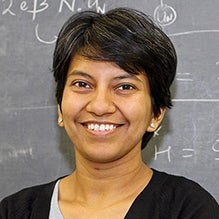
Archana Kamal, University of Massachusetts Lowell
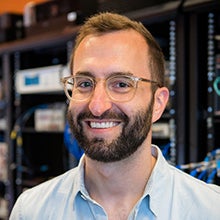
Jeff Grover, MIT
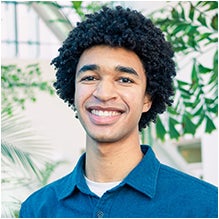
John Martyn, MIT
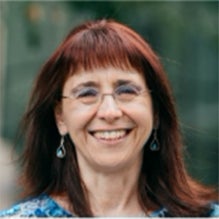
Lorenza Viola, Dartmouth College
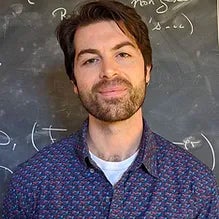
Tucker Manton, Brown University

Vanita Srinivasa, University of Rhode Island
Invited Speakers Biographies
Archana Kamal
Archana Kamal is an Associate Professor in the Department of Physics and Applied Physics at the University of Massachusetts Lowell (UML) and directs the QUantum Engineering Science and Technology (QUEST) Group at UML. After completing her pre-doctorate education in India, she pursued her doctoral research at Yale University, followed by a postdoctoral stint at MIT. Her research spans both fundamental and applied aspects of quantum information processing, with a focus on engineered quantum systems that are “controllable” like classical machines, while intrinsically behaving quantum-mechanically like atoms. Her research led to new designs of noise-resilient artificial atoms (or “qubits”) and new protocols for noiseless information routing and nonreciprocal amplification, which are now routinely employed in many laboratories around the world. Some of the current themes of her research include generation and control of large-scale entanglement, high-fidelity quantum measurement and readout, and applications of quantum information concepts to tackle questions at the interface of condensed matter, cosmology and thermodynamics. Her contributions to nonreciprocal quantum signal processing were recognized by MIT Technology Review with a TR35 – Global Innovator Award in 2018. She is also the recipient of 2021 AFOSR Young Investigator Award and 2021 NSF CAREER Award.
Jeff Grover
Jeff Grover is a Research Scientist and co-PI in the Engineering Quantum Systems (EQuS) group at MIT. He focuses on software infrastructure and building extensible calibration, control, and metrology protocols for superconducting qubit systems. Jeff received his PhD in Physics from the Joint Quantum Institute at the University of Maryland, and his BAs in Physics and Mathematics from Amherst College. Prior to EQuS, he built quantum annealing hardware at Northrop Grumman and applied machine learning to healthcare at athenahealth.
John Martyn
John is a PhD student at MIT, working with Isaac Chuang. In his research, he explore quantum information, computational physics, and machine learning. Prior to graduate school, he received a B.S. from the University of Maryland, and worked as a student researcher at Caltech and (Google) X.
Lorenza Viola
Lorenza Viola is a theoretical physicist specializing in quantum information science. Following a “Laurea” (MS) degree in physics from the University of Trento, Italy, in 1991, and a Ph.D. in theoretical physics from the University of Padua, Italy, in 1996, she has been a postdoctoral fellow at the Massachusetts Institute of Technology until 2000 and then a J. R. Oppenheimer Fellow at Los Alamos National Laboratory. In 2004, she joined the Department of Physics and Astronomy at Dartmouth College, where she is now the James Frank Family Professor of Physics. Her research interests cover a range of topics within quantum information physics and quantum statistical mechanics — including methods for noise characterization and control in open quantum systems and quantum computation, quantum sensing and metrology, quantum phase transitions and topological phases of matter. She is a board member of the International Physics and Control Society and is presently serving as a Divisional Associate Editor for Physical Review Letters. For her contributions, she has been elected a Fellow of the American Physical Society in 2014.
Tucker Manton
Dr. Manton is originally from Colorado and was educated in public and state schools. He received bachelor degrees in physics and mathematics from Colorado State University in 2016 before moving to Arizona to attend graduate school at Arizona State University. There he was advised by Professor Damien Easson, and his graduate research spanned various subjects including early universe cosmology, string theory, modified gravity, and a particular mapping between scalar, gauge, and gravity theories called the double copy. He received an M.S. in 2019, and following his Ph.D. awarded in 2022, he moved to Providence to work with Professor Stephon Alexander at Brown University. As a postdoc, Dr. Manton’s research interests diversified further. In addition to expanding on his research in the double copy, he has published papers studying non-compact Yang-Mills theory and particle dark matter, about which he will be presenting today.
Vanita Srinivasa
Vanita Srinivasa is an Assistant Professor of Physics and the first Director of the Quantum Information Science (QIS) Program at the University of Rhode Island. Her research program in QIS focuses on the theory of semiconductor-based and hybrid implementations of quantum information processing, with interests ranging from the fundamental physics of charge-photon and spin-photon coupling, electron-electron and electron-phonon interactions, and open quantum systems to the application of quantum optics to solid-state devices and the development of approaches for extended-range entanglement and modular quantum information processing with spin qubits. After completing her Ph.D. in Physics at the University of Pittsburgh in 2012, she worked as a postdoctoral scholar at the Joint Quantum Institute of the University of Maryland and NIST and subsequently at the Laboratory for Physical Sciences. From 2017-2020, she was a Senior Research Scientist in Quantum Information Processing in the Center for Computing Research at Sandia National Laboratories, prior to joining the faculty of the URI Physics Department in 2020.
